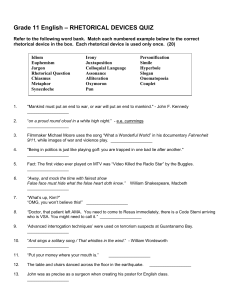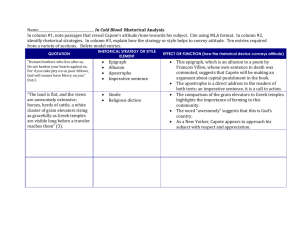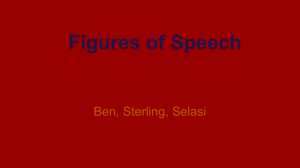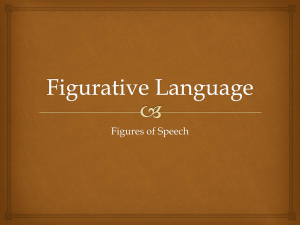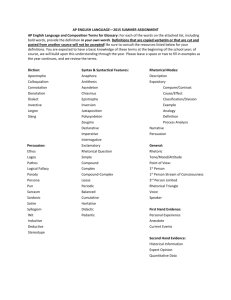File
advertisement
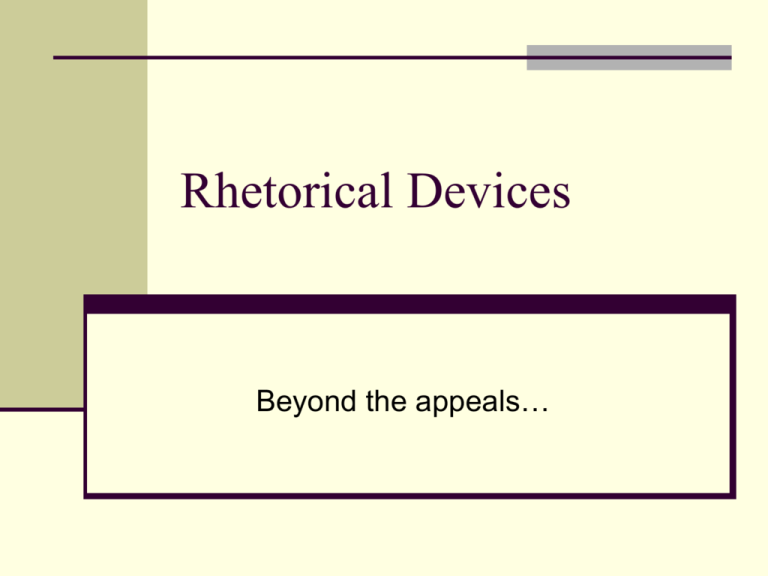
Rhetorical Devices Beyond the appeals… Aristotle’s Appeals Pathos Ethos Logos Rhetoric the art of effective or persuasive speaking or writing, esp. the use of figures of speech and other compositional techniques. Common Devices Humor Repetition Personification: “Blind justice wept the day Sam Roberts was acquitted.” Irony: Saying one thing, but meaning another Imagery: Creating a sensory experience with words Simile/ Metaphor/ Analogy A good simile is like a clean window looking into the mind of the writer. The metaphor is the window to the poet’s soul. The analogy is as important to the writer as the computer model is to the builder. Analogy The analogy makes use of something already well known to explain something that is less well known. Uses: Clarify ideas Expand ideas Analogy You may think laws restricting your ability to download music from the Internet are unfair, but you wouldn’t steal a CD from the music store, would you? If you’re going to eat fruits and vegetables grown with pesticides, you may as well throw yourself in front of a speeding truck. Allusion You don’t have to be Holden Caulfield to appreciate a good allusion. A reference to a fairly well-known event, place or person – actual or fictional. Short Not formally introduced Helps the reader understand a concept or specific emotion Allusion Mythology Bible Shakespeare While you might think that owning your first car might make you feel like Perseus riding his winged horse, if you’re not careful, you find yourself chained to a rock like Prometheus. Exemplum You’ll find this device to be very useful, especially in research papers, for example, when you want to cite specific authorities or quote specific sources. Provides an example to illustrate the point Real world examples = best Exemplum People are often attracted to things which are forbidden to them. During the 1920’s, for example, Prohibition in the United States caused illicit alcohol sales to skyrocket. Rhetorical Question Don’t you want to know how to use them well? A question in which the answer is implied Gives the writer an opportunity to highlight something readers know Use to emphasize crucial points ONLY use when you are 100% certain 100% of the audience will supply the correct answer Most often “yes” or “no” Rhetorical Question For what can war but endless war breed? In this age of modernity, can we truly condone such horrific acts? Do you want a world in which those dearest to you can know peace and safety or a world in which every moment carries with it the constant fear of death? Hypophora Hi-pa’-fa-ra So what is this? Read on, and you will see. Asking a question then answering it. Uses: Introduce an idea Anticipate questions Direct questions Ask effective questions Hypophora How do we know this to be true? We have observed it in the lab. Do we then submit to our oppressor? No. No. A thousand times, no. You may well ask: “Why direct action? Why sit-ins, marches and so forth? Isn’t negotiation a better path?” You are quite right in calling for negotiation. Indeed, this is the very purpose of direct action. Hyperbole Hi-per’-ba-lee This is the most popular and commonly used rhetorical device in the entire world of rhetorical devices! Exaggerating part of a statement to give emphasis or focus Uses: Energize Humor Highlight differences Hyperbole Examples: The planet is getting so crowded we may have to take turns sitting down. There are more reasons for NASA to find a trip to Jupiter than there are miles in the journey. At these words, the people became so silent you could hear a beating heart from across the room. Understatement You might find this device somewhat helpful as well. The force of a descriptive statement is less than what one would normally expect. Uses: To highlight how powerful an event or idea actually is Impact Humor Understatement Leonardo da Vinci had a good idea or two. The Middle East is currently having some political squabbles. To the uninitiated, neurophysiology can be a bit of a challenge. Antithesis An-tith’-a-sis A fairly simple way to show a complex thought. Uses contrasts in language to bring out contrasting ideas. Pleasing to the ear Tip: Alliterate the contrasting words: kind and cruel, hope and heartache Antithesis That’s one small step for man, one giant leap for mankind. “not be judged by the color of their skin but by the content of their character.” War is not fought to achieve joy, but rather to avoid pain. Parallelism Giving students a quiz makes them groan, but surprising them with a pop quiz makes them scream. Uses the same general structure for multiple parts of a sentence or for multiple sentences in order to link them all. Matching cadence, form or the subjects Adds clarity and fluency Chiasmus Ki-az’-mus He smiled happily and joyfully laughed. A special form of parallelism Flips structure Parallelism vs. Chiasmus We can not dedicate – we can not consecrate – we can not hallow – this ground. The brave men, living and dead, who struggled here, have consecrated it, far above our poor power to add or detract. The world will little note, nor long remember what we say here, but it can never forget what they did here. It is for us the living, rather, to be dedicated here to the unfinished work which they who fought here have thus far so nobly advanced. It is rather of us to be here dedicated to the great task remaining before us… that this nation, under God, shall have a new birth of freedom; and that government of the people, by the people, for the people, shall not perish from the earth. Apostrophe My friend, if you learn to use apostrophe well, you will surely be a beloved writer. Break the flow to directly address a person or object, present or not. Emotional device Apostrophe So the sun set over Paris – Paris, my first love, sultry and secretive, beguiling and shy, how I wanted to hold you forever as the sun went down that summer day. Death, be not proud, though some have called thee / Mighty and dreadful So we near our conclusion, and I must ask you, my wise reader, to bear with me for one more small digression Asyndeton / Polysyndeton Asyndeton is one of the best, most expressive, effective rhetorical devices there is, while polysyndeton is interesting and instructional and stylish. A = no conjunctions, fast-moving, spontaneous Poly = many conjunctions, calculated, increasing urgency Asyndeton / Polysyndeton They sat under one roof, princes, dukes, barons, earls, kings. The banquet table was a riot of beef and pork and lamb and fish and fresh vegetables and candied fruits and all sorts of wonderful dainties. The runner passed the ten-mile mark and the fifteen and the twenty, and the finish line loomed in front of him. Synecdoche Sin-neck’-da-key The use of part of something to represent the whole EXAMPLES The rancher boasted about how many head of cattle he owned. All hands on deck! I was amazed at how many mouths they had to feed on such a small income. Metonymy Ma-tan’-i-me Refers to something closely related to the actual object and use that as a way of referring to the object. Symbols EXAMPLES The White House answered its critics. The pen is mightier than the sword. Wall Street hopes to see gains today. Synecdoche / Metonymy Surprise readers by inviting them to consider a familiar idea from a new angle. Amplification This is an important device – more than mere repetition – it’s an actual expansion of the information already given. Repeats what was just said, while adding more detail and information Adds style Use: to focus the reader’s attention on an idea he or she might otherwise miss. Emphasizes more than informs Amplification It was a cold day, a wicked day, a day of biting winds and bitter frost. Next we come to the fruit fly – the drosophila melanogaster, that tiny, insubstantial bug, on whom the foundations of biology have rested for so long. Attitude is the most important part of living: one’s attitude determines how one perceives, makes decisions, and achieves success or suffers failure. Zeugma Zoog’ ma With mastery of this device, join two words and the ranks of skillful writers. Unexpected items are linked by a shared word Usually eliminates verb repetition Help reader make connections Zeugma The runner lost the race and his scholarship. The man ran a hundred miles, but out of time. The teenage sweethearts, the elderly couple, and the flickering candles all danced late into the night. Rhetorical Devices Humor Irony Repetition Imagery Personification Simile Metaphor Analogy Allusion Exemplum Rhetorical question Hypophora Hyperbole Understatement Antithesis Parallelism Chiasmus Apostrophe Asyndeton Polysyndeton Synecdoche Metonymy Amplification Zeugma
